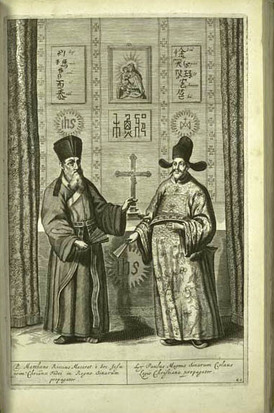This is old news by now, but the Agenzia Fides reported back in late January that the cause for canonization for Father Matteo Ricci is again active. Ricci always held a special place in my imagination partly because he was (and continues to be) maligned by ideologues. I noted Ricci's 400th anniversary on this blog back in May.
The sainthood cause for 16th-century Jesuit missionary Matteo Ricci was reopened on January 24, following Mass at the Cathedral of San Giuliano in the diocese of Diocese of Macerata-Tolentino-Recanati-Cingoli-Treia, where he was born.
The process of beatification originally launched in 1984 when he was named a Servant of God. Bishop Claudio Giuliodori of Macerata said that although the cause stalled soon after it was opened, "these 25 years have not passed in vain because the Lord has given us clear signs of a deeper understanding of the prophetic intuitions of Father Matteo Ricci."
Father Matteo Ricci was born in 1552 in the Marche town of Macerata. He entered the Society of Jesus and was missioned by his superiors to study mathematics and astronomy before leaving for the Far East at the age of 26.

Ricci's itinerary included four years in Goa (west coast of India) before traveling to China. On mainland China he settled in Zhao Qing in the southernmost Guangdong Province; he was proficient in studying Chinese. During his time there he produced his global "Great Map of Ten Thousand Countries," which revolutionized the Chinese understanding of the rest of the world. A copy of the map is on display at the United States Library of Congress.
In 1589 Father Ricci moved to Zhao Zhou and began sharing European mathematical discoveries with Chinese scholars. He became known as "Li Madou" and was renowned for his extraordinary memory and knowledge of astronomy. He eventually became a member of the court of Ming Emperor Wanli.
In 1601 he was allowed into the Forbidden City of Beijing, where he worked until his death in 1610.
Ricci's postulator (the person promoting the inquiry for the sainthood) is Jesuit Father Anthony Witwer, who is coordinating and supervising a historical commission that has been established to collect all the writings and documents attributed to Father Ricci, along with those that reference him in publication. The commission's work will conclude with a critical study on the writings of Matteo Ricci along with a judgment as to the authenticity and value of documents on him.
In a message to the Diocese of Macerata inaugurating commemorations of the 400th anniversary of Father Ricci's death in Beijing in 1610, Pope Benedict XVI wrote that Father Ricci was "gifted with profound faith and extraordinary cultural and academic genius." He "dedicated long years of his life to weaving a profound dialogue between West and East, at the same time working incisively to root the Gospel in the culture of the great people of China. Even today, his example remains as a model of fruitful encounter between European and Chinese civilization. In considering his intense academic and spiritual activity, we cannot but remain favorably impressed by the innovative and unusual skill with which he, with full respect, approached Chinese cultural and spiritual traditions. It was, in fact, this approach that characterized his mission, which aimed to seek possible harmony between the noble and millennial Chinese civilization and the novelty of Christianity, which is for all societies a ferment of liberation and of true renewal from within, because the Gospel, universal message of salvation, is destined for all men and women whatever the cultural and religious context to which they belong."
The Pope continued, "What made his apostolate original and, we could say, prophetic, was the profound sympathy he nourished for the Chinese, for their cultures and religious traditions." Ricci was likewise "a model of dialogue and respect for the beliefs of others and made friendship the style of his apostolate during his twenty-eight years in China."
History shows us that Ricci remained faithful to this style of evangelization to the end of his life. He made the gospel accessible to people, especially the intellectual classes by "using a scientific methodology and a pastoral strategy based, on the one hand, on respect for the wholesome customs of the place, which Chinese neophytes did not have to abandon when they embraced the Christian faith and, on the other, on his awareness that the Revelation could enhance and complete" those customs. As the Fathers of the Church did in the time of the encounter between the Gospel and Greco-Roman culture, the author of the "Treatise on Friendship" undertook his "farsighted work of inculturation of Christianity in China by seeking constant understanding with the wise men of that country."
The concluded his anniversary remarks by saying that we, "Following his example, may our own communities, which accommodate people from different cultures and religions, grow in a spirit of acceptance and of reciprocal respect."
Anthony E. Clark's article "Weaving a Profound Dialogue between West and East": On Matteo Ricci, S.J., for Ignatius Insight is helpful for a much broader perspective. Plus, Scranton University hosts a blog entry on Father Ricci that shows a bit his depth of character that you may find interesting.


Leave a comment